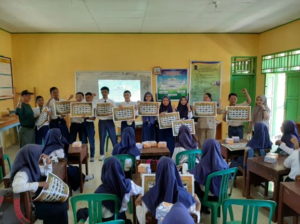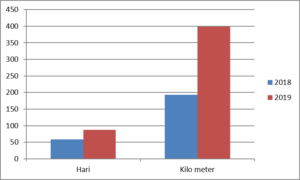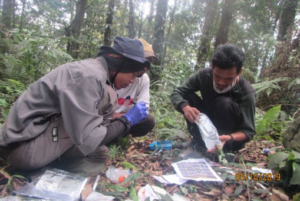Forest-edge communities in Bengkulu, to the east of Kerinci Seblat National Park (the second largest Protected Area in Indonesia), have been identified as hunting hotspots. It is here that the Lingkar Institute is working to reduce illegal hunting and protect the population of Sumatran tigers that live nearby.
Through a multifaceted approach Lingkar Institute are using the core belief that it is prohibited by Muslim law to hunt and kill endangered species.
The project was implemented to strengthen the conservation of Sumatran tigers through practical collaboration between government, religious leaders and local communities on the edge of the forest by building awareness using Islamic perspectives and values. In addition, the project also encourages local government policies to strengthen conservation work by adopting conservation education into the education curriculum for junior high school students and the formation of a Task Force for Managing Human and Animal Conflict.
During the project period, much progress has been made in collaboration with the Indonesian Ulema Council (Majelis Ulama Indonesia/MUI) which is actively promoting the Fatwa Prohibition of Hunting and Trafficking Protected Animal to local forest-edge communities in the project area.
Lingkar Institute visited 3 junior high schools to try out the conservation education syllabus that has been prepared in the project during the previous project period. The teachers and the Education Office responded very enthusiastically to the plan for adoption of conservation education as one of the subjects to be formally taught in junior high schools considering that geographically 70% of Lebong Regency area is forest area.
In the field, by using information networks from the local community, the Lingkar team has conducted 14 88-day SMART patrols with a distance of 398 km and has found and cleared 2 inactive tiger snares, 3 active prey snares and 17 active prey snares. In addition, the information is also used for investigative purposes.
From the various advances made during the project period, the Team also experienced technical obstacles, especially in the practicalities of forming the Human and Animal Conflict Mitigation Team in Lebong District. Local elections held up the process but in February 2020 just after the end of this project period, the Regency Decree was finally signed to instigate this important team.
Impacts:
- 8 forest-edge communities targeted with meetings and literature on the fatwa on killing endangered species.
- 3 junior high schools introduced to the new conservation education curriculum
- Created and distributed 1000 posters identifying endangered wildlife
- 14 88-day SMART patrols with a distance of 398 km recording 17 inactive prey snares, 2 inactive tiger snares, and 3 active prey snares compared to 7 tiger snare in 2018.
- Anecdotal evidence from religious leaders suggest that hunters are avoiding Sumatran tigers once they know about the fatwa.
- A task force for managing Human Wildlife Conflict established by the Degree of the Regent of Lebong in February 2020 with Lingkar in partnership with the Lebong Environmental Agency and the Warang Imo KPA.
Read the full report here

1000 posters identifying endangered animals © Lingkar Institute

Lingkar Institute Patrols days/km

Evidence © Lingkar Institute

